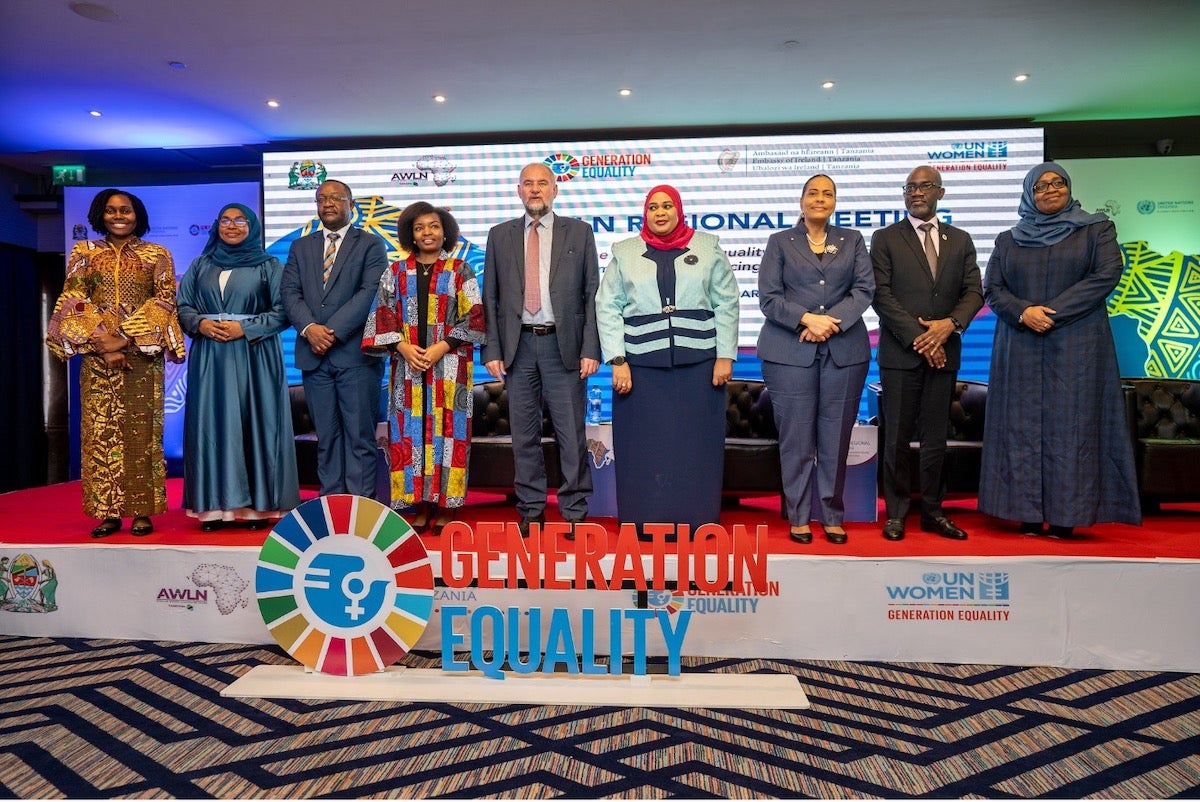Generation Equality Commitment Makers in the Spotlight: Tanzania’s Bold Journey Toward Gender Equality and Inclusive Growth
Date:

Women's economic empowerment fuels global progress and inclusive growth. Recognizing this, Tanzania made significant commitments at the 2021 Generation Equality Forum to address systemic gender inequalities and unlock the potential of women under the Action Coalition on Economic Justice and Rights. In line with these commitments, Tanzania, as a global champion, launched a five-year programme under the UN’s Generation Equality initiative and established a dedicated National Advisory Committee to actively dismantle barriers to women’s leadership and economic participation.
Women’s economic empowerment is not just an investment – it’s a catalyst for transformative change, with rippling effects that uplift entire communities and fuel global progress. When women thrive, their families prosper, societies advance, and economies flourish. Women's empowerment paves the way for gender equality, eradicates poverty, and fosters inclusive growth, bringing innovative ideas and boundless energy into industries across the globe. Yet, despite these undeniable benefits, millions of women worldwide remain marginalized, underrepresented in formal employment, and unable to access the resources they need to unlock their full potential.
Tanzania, recognizing the immense value of women’s economic empowerment, made bold commitments in 2021 at the Generation Equality Forum, and subsequently launched a five-year programme under UN Women’s Generation Equality initiative. This plan, endorsed by President Samia Suluhu Hassan, aims to break down systemic barriers and create pathways for women’s participation and leadership in Tanzania’s economy. With the formation of a National Advisory Committee comprised of 25 experts focusing on women, youth, and people living with disabilities, Tanzania is not just monitoring progress – it’s driving real, tangible change on the ground.
Central to these commitments is the transformation of the care economy, where efforts are being made to alleviate the unequal burden of unpaid care work on women through the establishment of early childhood development centers, allowing them to participate fully in economic life. Through targeted initiatives, training, and business support, the country is advocating for gender-responsive economic policies. Additionally, Tanzania is advancing decent work and gender representation in companies and supply chains, offering inclusive benefits, and empowering women entrepreneurs with tailored financial products and business services.
Forging Partnerships, Transforming Lives: Tanzania's Path to Gender Equality
At the heart of Tanzania’s ambition is a powerful belief: partnership is key. The government is forging new alliances with the private sector, civil society, academia, and development partners such as the Government Finland, Ireland and the Bill and Melinda Gates Foundation to ensure that the country’s Generation Equality commitments result in sustainable, impactful investments. By appointing local government focal points, Tanzania has linked gender equality directly into the fabric of its national and local planning processes, ensuring that gender-focused policies, budgets, and programmes not only stay on track but actively transform lives.
Ms. Angellah Kairuki, Chair of the Tanzania Generation Equality Committee, underlines the importance of these collaborations: “We, as the government, are committed to unlocking more partnerships with the private sector, civil society, women networks, research and academia, and the EU. We believe we can achieve sustained investment in gender equality if we engage with each other.”
The Generation Equality Forum is a movement that continues to unite the increased investment and action towards gender equality, but it also exemplifies the power of collective action, but also it is an opportunity to unite a diverse range of stakeholders with the shared purpose. It is through this collaborative creative spirit, which is needed to break down the barriers, but to be able to also achieve the lasting change for women and girls.
One of the programme’s flagship initiatives is the launch of the National Financial Inclusion Framework, designed to unlock barriers preventing young women, persons with disabilities, small-scale farmers, and fishers from accessing financial services. Over the next five years, this framework aims to start transform economic participation, bringing women into the heart of business, finance, and entrepreneurship.
Another inspiring achievement in Tanzania’s journey is the establishment of the Jasiri Gender Bond in 2021by Tanzania’s NMB bank, aimed at supporting gender equality through financial inclusion. Initially seeking $10 million, the bond raised over $30 million, benefiting over 6,000 women through microloans. “The Jassiri Gender Bond has been running for over two years now. During that time, we have disbursed over 6,000 microloans and over 150 small and medium-sized enterprises loans. Out of that, we have also distributed over 300 agricultural loans” says Ms. Wende Kalinga, Capital Market Specialist at NMB Advisory Desk. The gender bond was the first of its kind in Sub-Saharan Africa, and Tanzania’s leadership in this space has earned it global recognition as one of only seven countries included in the prestigious Nation’s Equality Active Stakeholder Leadership group.
At a 2024 Generation Equality meeting with the African Women Leaders network in Dar es Salaam, Ms. Angellah Kairuki, Chair of the Tanzania Generation Equality Committee, pledged that Tanzania will do everything within its power to ensure the voices of young women and girls are integrated into our discussions, planning, and decision-making platforms: “This will help us drive meaningful actions not only here in Tanzania but also across the region and on the global stage", she said.
From the shores of Zanzibar to the bustling streets of Dar es Salaam, the seeds of change are being sown. Women and youth are taking their rightful place at decision-making tables, shaping policies, driving innovation, and creating a more equitable future. Tanzania stands confident in the knowledge that the progress being made today is building a brighter tomorrow - not just for its citizens, but as a leader and inspiration for the region and the world.